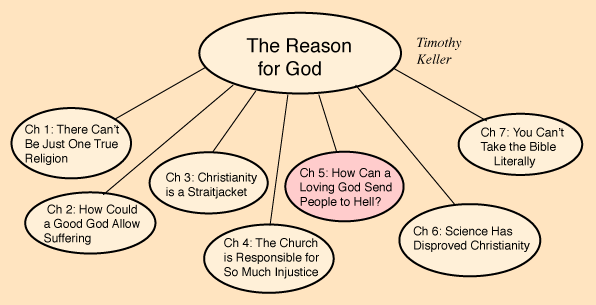The Reason for God
Timothy Keller
Chapter 5: How Can a Loving God Send People to Hell?

Doubt: If Christians believe someone is headed for hell then he/she is unequal in dignity or worth. (There but for the Grace of God, etc. . . )
- In our culture, divine judgment is one of Christianity’s most offensive doctrines.
In ancient times people believed in a transcendent moral order.
- If you violated it, you suffered consequences just as if you violated physical laws.
- Wisdom was learning to live in conformity to this reality.
Modernity reversed this understanding.
- Ultimate reality was seen as a physical rather than supernatural order.
- So rather that shape ourselves, we shape reality to fit our desires.
CS Lewis notes that magic and modernity (science) grew up together.
- There was little magic in the middle ages – it came hand in hand with science.
- Where wisdom had focused on conforming the soul to reality through knowledge, self-discipline and virtue, science and magic sought to subdue reality.
And so modernity gave us the responsibility to determine right or wrong.
- We shape not only the physical but the metaphysical realm as well.
This belief makes Biblical truth and prescription uncomfortable.
But if God’s word is transcultural Truth for all people at all times, shouldn’t we expect it to contradict and offend every human culture at some point?
How do we reconcile judgment and love?
- Perhaps the concept of divine judgment is the major place where God’s word confronts our modern culture.
- But we know that love and judgment go together.
- Don’t we judge when a loved one is ravaged by unwise actions or relationships?
- Anger is not the opposite of love, hate is. [God is a jealous God!]
- But if God will judge, and our deeds are imperishable (as all religions recognize), our passion for justice can be honored without vengeance: in heaven or hell.
- But what about hell? Isn’t that punishment “cruel and unusual?”
- If sin is whatever separates us from God, then when we don’t focus on God, we focus on ourselves.
- We all know what pathological self-centeredness does to people: selfishness, envy, bitterness, anxiety, paranoia, denials and distortions.
- Imagine if at death, the self-absorbed simply continue uninterrupted on this path. Would that not be hell?
- If sin is whatever separates us from God, then when we don’t focus on God, we focus on ourselves.
- Is hell then the eternal trajectory of the self-absorbed soul? Is it simply one’s freely chosen identity apart from God on a trajectory into infinity?
- We see this process “writ small” in addition. First disintegration, then isolation, then the loss of reality. It is “writ large” in hell.
Hell, freedom, choice and human quality.
- People mistakenly believe that if they glorify God, they will somehow lose power and freedom.
- But unfortunately that choice – not to worship – gives them contemporary freedom from God and eternal life without Him.
- CS Lewis called Hell “the greatest monument to human freedom” and says: “All that are in Hell choose it. Without that self-choice it wouldn’t be Hell.”
- But does perceiving someone as lost mean they are of lesser value? NO!
- “Both the Christian and the secular person believe that self-centeredness and cruelty have very harmful consequences. Because Christians believe souls don’t die, they also believe that moral and spiritual errors affect the soul forever. Liberal, secular persons also believe that there are terrible moral and spiritual errors, like exploitation and oppression., But since they don’t believe in an after, they don’t think the consequences of wrongdoing go on into eternity. Because Christians think wrongdoing has infinitely more long-term consequences than secular people do, does that mean they are somehow narrower?”
- In Conclusion
- Only the Bible says God created the world out of love and delight.
- We only know the He is a God of love through the Bible.
- But from this same source, we know He is a God of judgment who will put all things right in the end.
| Quotes and comments |
| Reading Reference |
| Software Reference | R Nave |